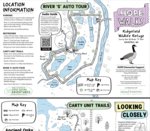

The HOPE Dementia Support group has a series of trail maps for people with dementia and their families across Clark County. The organization recently created its third map of the Ridgefield Wildlife Refuge.
Julie Donovan, HOPE’s vice president, is eager to unveil the new map and bring caregivers and their loved ones out into the community.
“We had received an auction item for our last in-person fundraiser and it was this map with a series of information designed for children, which got a few of us asking ‘what would it be like if we had something easy that would enable people living with dementia and their families to navigate the outdoors a little more easily?’” said Donovan. “From that, we started working with a couple of the lead trail volunteers from the Vancouver Parks and Recreation (Department), Super Nature Adventures, and some of our own volunteers talking about what it would look like and what would be needed to distinguish it from other maps out there.”
Some of the factors they considered when designing the maps included the proximity of bathrooms and accessibility for wheelchairs or walkers.
“It’s about enabling people to be outside and creating more peace-of-mind safety around that,” she said.
The organization’s first map was published when the COVID-19 pandemic started. Donovan said the trails have been successful. HOPE partners with the Area Agency on Aging and Disabilities of Southwest Washington for the maps, who also help the organization spread the word about the trails.
Based on feedback, Donovan said they think the path is easy to follow. The staff at HOPE also made sure to include seating locations, picnic benches, elevation changes, and inclines or declines thanks to feedback from families.
“It may not be your typical map key, but we wanted to make sure those elements were included for the people who needed them,” Donovan said.
The maps are hand drawn, which she says also makes them unique.
Bryna Campbell and Mike Murawski, the co-creators of Super Nature Adventures, also walked the trails thoroughly to help outline the maps.
The back of the maps contains facts about the area like the types of trees located there and the sounds people can hear.
“Things like that really encourage being outside,” she said.
Although the map is tailored toward dementia patients and their families, Donovan said they’re applicable to anyone who wants to explore the trails.
Other services HOPE provides include online weekly support groups for caregivers, as well as MaryAnn’s Babies, which is a doll or pet therapy aimed at improving the comfort of adults with dementia and similar conditions. They also have activity boxes for patients in the hospital, rehab, or in memory care that include fidget toys, textural toys and playing cards, which are designed to ease the anxiety people with dementia may feel, and improve mood and communication. All of their programs, including the trail maps, are free.
Donovan said there are many forms of dementia, with the most well known being Alzheimer’s, vascular dementia, Lewy body dementia, and frontotemporal dementia. Some people can also have more than one type, she said. Although dementia is typically associated with memory loss, some forms of the disease like frontotemporal dementia, start more with behavioral changes and changes in judgment.
According to the Alzheimer’s facts and figures from 2021, there are 120,000 individuals with dementia in Washington state. By 2025, it’s predicted that will grow to 140,000 people.
The HOPE Walks Trail maps can be found online at ho
pedementiasupport.org/hope-walks-program-and-trail-maps and the Alzheimer’s facts and figures can be found at alz.org/media/documents/alzhei
mers-facts-and-figures.pdf.